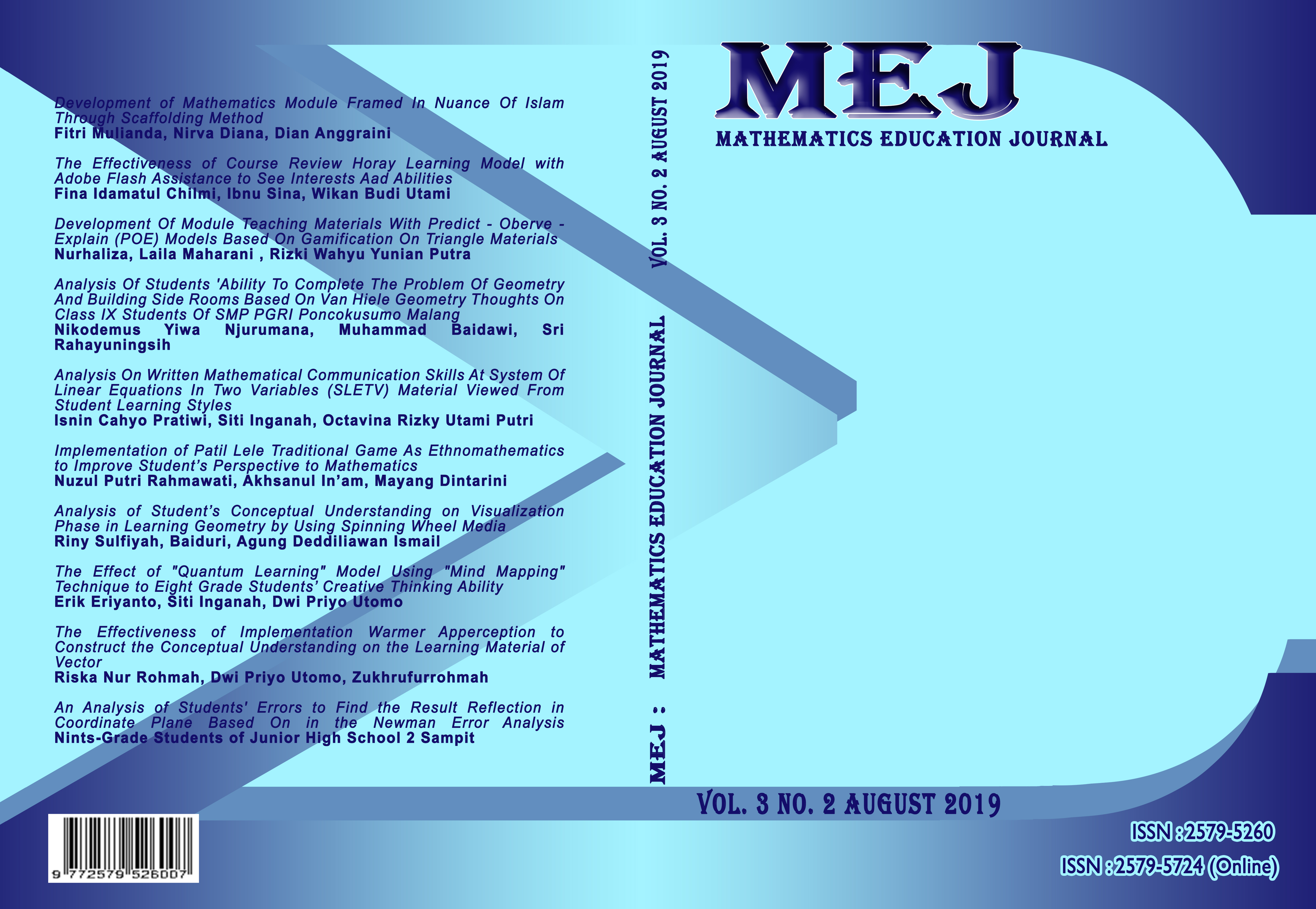Development Of Module Teaching Materials With Predict - Oberve - Explain (POE) Models Based On Gamification On Triangle Materials
DOI:
https://doi.org/10.22219/mej.v3i2.11051Keywords:
Module Teaching Material with Gamification-Based Predict - Oberve - Explain (POE) ModelAbstract
The learning process is certainly not only limited to the increase in students' knowledge or cognitive abilities, but also includes better behavior and thinking abilities, and no less important is how the learning process makes students able to solve problems faced both in learning in school, as well as in the daily life they experience. The development of ICT technology has had an impact on the development of the games industry, which makes educators more creative in designing their learning processes. Some game designers have studied deeper about psychology or other sciences that study human motivation and behavior. The method in this research is research and development (R&D) with the ADDIE development model. Data collection instruments used were questionnaires given to material experts and media experts to find out the feasibility of the product, and given to students and educators, to find out the attractiveness of the products that have been developed as well as pretest and posttest test instruments. Based on the analysis of data obtained from material experts and media experts, it was stated that the teaching materials developed were feasible to be used, and the analysis of the data obtained from students and educators stated that the teaching materials developed were very interesting. The results of the analysis of the effectiveness of class data applied teaching material obtained and calculated with the formula Effect Size obtained is . E_s calculation results are then interpreted to see the effectiveness criteria, the magnitude of , which is in the range of , based on the category determined by the level of effectiveness of the magnitude of the class applied to learning using module teaching materials with the Predict - Oberve learning model - Explain (POE) based on gamification on the material of SMP triangles is categorized quite effective with a classification classified as medium.Downloads
References
Adebayo, F & Theodora B.“Generative and Predict-Observe-Explain (POE) instructional Strategies: Toward Enchancing Basic Science Practical Skill of Lower Primary School Pupils”. Internasional Journal of Elementary Education. 2015; Vol 4 No. (4), halaman: 86-92.
Azhar Arsyad. Media Pembelajaran. Jakarta: PT Grafindo Persada. 2013: 101.
Bambang S. A. “Pengembangan Modul Matematika Dengan Strategi Problem Solvin Guntuk Mengukur Tingkat emampuan Berpikir Kreatif Matematis Siswa,”Al-Jabar: Jurnal Pendidikan Matematika. 2015; vol 6, no. 2, halaman: 122.
Hamndani Hamid. Pengembangan Sistem Pendidikan di Indonesia. Bandung: Pustaka Setia. 2013: 34.
Hamzah B. Uno dan Nurdin Mohamad. Belajar dengan Pendekatan PAILKEM. Cet. Ke-2.Jakarta: Bumi Aksara, 2012:12.
Imas Kurinasih dan Berlian Sani.Implementasi Kurikulum 2013 Konsep dan Penerapan. Surabaya: Kata Pena. 2014: 3.
Ismail Suardi Wekke, Ridha Windi Astuti.Kurikulum 2013 di Madrasah Ibtidaiyah: Implementasi “. Tadris: :Jurnal Keguruan dan Ilmu Tarbiyah. 2017: Vol.2 No.1,halaman: 33.
Matthew Kearney and David F. (2001). Treagust, Constructivism As A Referent in The Design and Development of A Computer Program UsingInteractive Digital Video to Enhance Learning in Physics, Electronic Australian Journal of Educational Technology. 2001. vol 17 (1), halaman: 64-79.
Muhammad Takdir. Kepomath Go Penerapan Konsep Gamifikasi dalam Pembelajaran Matematika dalam Meningkatkan Motivasi Belajar Matematika Siswa. Jurnal Penelitian Pendidikan Insani. 2017. Vol 20, No 1. halaman: 1 – 6.
Sutriningsih, Naning. Pembelajaran Lingkaran Melalui Strategi Pemecahan Masalah Sistematis. Jurnal Kreasi. 2015. Vol. XV No. 1.halaman 28-35.
Sugesti, Fitri Era. Efektivitas Pembelajaran Statistika Kelas IX SMP Melalui Model Pembelajaran Kooperatif. Jurnal e-DuMath. 2015. Vol 2 No. 1. halaman: 78-85.
Downloads
Published
Issue
Section
License
Authors who publish with MEJ (Mathematics Education Journal) agree to the following terms:
For all articles published in MEJ, copyright is retained by the authors. Authors give permission to the publisher to announce the work with conditions. When the manuscript is accepted for publication, the authors agree to automatic transfer of the publishing right to the publisher.
Authors retain copyright and grant the journal right of first publication with the work simultaneously licensed under a Creative Commons Attribution-ShareAlike 4.0 International License that allows others to share the work with an acknowledgment of the work's authorship and initial publication in this journal.
Authors are able to enter into separate, additional contractual arrangements for the non-exclusive distribution of the journal's published version of the work (e.g., post it to an institutional repository or publish it in a book), with an acknowledgment of its initial publication in this journal.
Authors are permitted and encouraged to post their work online (e.g., in institutional repositories or on their website) prior to and during the submission process, as it can lead to productive exchanges, as well as earlier and greater citation of published work (See The Effect of Open Access).

This work is licensed under a Creative Commons Attribution-ShareAlike 4.0 International License.










